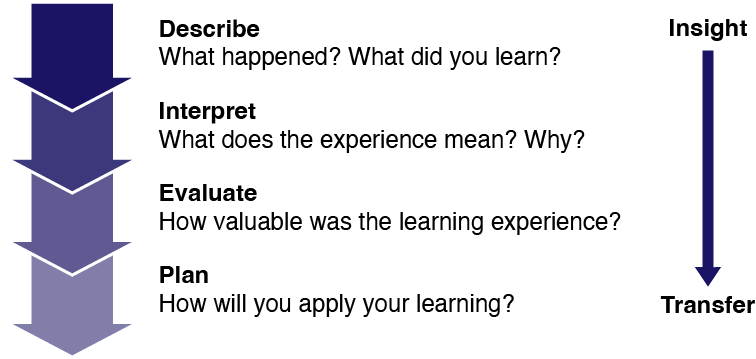Reflective writing
What is reflective writing?
Reflective writing is the process of putting your intentional reflective thinking into text and documenting the thinking and learning that has taken place. It also involves reflecting on an experience, interpreting and evaluating what happened, and planning how the lessons you’ve learnt can be applied in the future. Reflective writing might be for a wide audience, a specific reader, or undertaken as a personal activity.
Why is reflective writing important?
Reflective writing isn’t just venting your feelings, or something that needs to be done for the sake of paperwork or assessment. It also helps develop your critical thinking and metacognitive skills, giving you a lot more control over your own learning and professional development. These are skills which improve the more you put them into practice, so working on your reflective writing skills is an investment in your present and future self.
Reflective writing tasks help you work through the reflective process, and the documents you create through this process are evidence that reflection has occurred. They demonstrate the knowledge you have gained and how you have done so to the reader, who might be your university tutor, your professional mentor, or your present or future employer. It shows them that you are able to reflect, analyse, and come to relevant and logical conclusions based on your experience. Reflective writing documents your conscious improvement and awareness of your strengths and weaknesses and how that affects your personal, academic and professional life. It can provide rich evidence that you no longer need study or guidance to continue improving in your field and that you are ready to move on to a new challenge or opportunity.
Reflect
You have probably already done some form of reflective writing; it could have been for your studies, your job, or just your personal learning or enjoyment. Can you think of anything you’ve written that involved describing events, interpreting, and evaluating them?
-
- What type of text was it?
- Why did you write the text?
- Did anyone read it? Who?
- Was it helpful? Did you learn anything from it?
Where might you use reflective writing?
Now have a look through the slideshow to see some different types of reflective tasks and read about how they are used.
Characteristics of reflective academic writing
As you have seen, there are many forms of reflective writing, and the type of reflective writing you do will usually depend on why you’re writing it, your intended audience, and your discipline or profession. In higher education, reflective writing coursework and assessments vary in content across multiple disciplines, but most share some common characteristics.
Language and structure
Academic reflective writing is almost always written in the first person. As it’s for an academic audience, the language should be formal or semi-formal and you should use key terminology and vocabulary from the related discipline (e.g., the language you use for a reflection related to teaching practice, will be different to a scientific research reflection).
The text should be in logical paragraphs and generally follows a set structure with three main parts:
- a description of the experience and the writer’s thoughts and feelings (describe)
- the reflection on the experience – interpreting why the writer felt or acted a particular way (interpret and evaluate)
- the result of the experience – the writer’s plans based on the experience and what they have learnt (plan).
The DIEP model is one example of a structure you can use to organise a reflective writing task. This model requires you to Describe (what happened? what did you learn?), Interpret (what does the experience mean? why?), Evaluate (how valuable was the learning experience?) and Plan (how will you apply your learning?). Find out more about the DIEP model on RMIT’s Learning Lab

Content
Although the subject of a written reflection will change across disciplines, the expectations of the content will remain the same:
- it should express the writer’s personal experiences, thoughts, and feelings, but show objective reasoning when reflecting on the event.
- the descriptions of events and experiences should be succinct, with a greater focus on the why and how of the experience.
- the reflection should demonstrate how the writer has learnt from what happened and how it will inform their future practice.
Task
Reflective writing tasks for coursework or assessment will generally read by an educator. Tasks that are graded will have instructions and criteria explaining what should be included. This gives the writer a clear idea of how they will be graded and what they need to focus on.
Academic reflections often require the writer to connect personal experiences to academic theory studied in class, and to cite sources to give credibility. If you have used academic sources, you’ll need to include references, but you don’t need to reference your own thoughts and opinions.
Useful language for reflective writing
When doing academic reflective writing, it’s crucial for the reader to be able to follow your thought process easily. That’s why using language that effectively communicates your ideas is so important. Take a look at the expandable sections below to see specific types of vocabulary and sentence structures that can be useful when writing reflectively.
For a useful overview of reflective thinking and reflective writing, check out this video from the University of Hull:
Now that you have an understanding of reflective thinking and writing, it’s time to see how these skills are used in specific contexts. The following pages contain information on how reflective practice is used in education, healthcare, business, and design.
This page includes content adapted from:
- Reflective Writing by University of York Library licensed under CC BY-SA 3.0
- Reflective Practice Toolkit by Cambridge University Libraries licensed under CC BY-SA 4.0
Skills Team Hull Uni. (2013). Reflective Writing. YouTube. https://www.youtube.com/watch?v=QoI67VeE3ds

